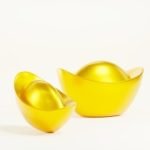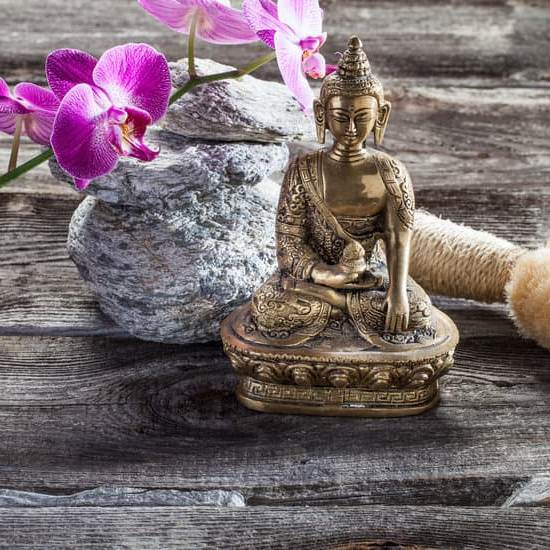Feng Shui is an ancient Chinese practice based on the principles of energy and balance. It is a form of interior design, but focuses on harnessing natural energy and positive chi to create harmonious living spaces that are both calming and inviting.
By using Feng Shui tips for good health, you can help promote mental clarity, emotional wellbeing, physical comfort, and financial stability in your home. In this article, we will explore simple Feng Shui tips that can bring balance to your life.
Declutter Your Home: The Core Principle of Feng Shui One of the core principles of feng shui is decluttering; removing any unnecessary or broken items from your home helps keep the space balanced and clear so that positivity can flow freely. Clutter distracts attention, takes up valuable space, overwhelms our surroundings, blocks paths for new opportunities to arrive as well as contributes poorly to your mental and emotional wellbeing.
Clearing out excess stuff is one effective way to use feng shui for good health because it encourages spatial order which radiates peace and harmony in the home environment.
Wrong Colors Bring Turbulence Colors play an important role in promoting a sense of balance when it comes to feng shui tips for good health. Generally speaking, all colors have some form of energy attached them but some colors hold more positives than others – while wrong colors could lead to tension and discordance around you. According to feng shui principles, warm hues like yellow or orange are associated with happiness while cool hues like blue or green denote peace.
Moreover, incorporating these colors into each room should be based on what you want to achieve – have calm vibes in a bedroom or a lively atmosphere in a living room? Pay close attention to how certain colors affect moods so that you can choose wisely.
Welcome Nature Into Your Home Naturally occurring elements like plants help brings vitality into spaces – making it easier for people feel relaxed yet energised at the same time. They are especially beneficial if there isn’t much natural light coming through e.g near those without balconies or windows overlooking green spaces etc This means they can absorb toxins whilst naturally humidifying air which eliminated allergens plus providing fresh oxygen for everyone within the dwelling (to refresh Healthy Climate).
Plants symbolize renewal plus growth precisely why bringing nature inside highly encouraged when using feng shui tips for good health; they purify air by eliminating chemical toxins + provide an overall relaxing aura throughout your domestic spaces.
Creating a Sense of Balance and Harmony in the Home
Feng Shui, an ancient Chinese practice, is scientifically proven to shape home environments in a way that improves occupants’ mental, emotional and physical wellbeing. Here are some tips to help tap into this potential:
- Start on the outside. Clear any clutter or debris from outside walkways and the front entrance to your home. It will improve the overall energy flow into the house.
- Declutter every room. Get rid of anything that doesn’t make you or your family members feel good.
- Acknowledge all five elements. Represent water, wood, fire, metal and earth to create a complete element balance.
One of the most important Feng Shui tips for good health is to create balance and harmony in the home by promoting Chi – which stands for good energy. This can be done by placing objects like plants or artwork strategically throughout space.
Furthermore, mirrors reflect light and energy back into spaces; placing one near entryways creates more positive energy throughout a home. Additionally, it is important to promote air circulation within the home by opening windows or adding fans in drawers away from direct sunlight – this will prevent stagnant air from gathering in corners and collecting germs and dust particles.
Eliminating any clutter is another important step in creating a healthy Feng Shui space – it allows all senses to be sharpened so occupants are better able to discern between what energizes them most and what depletes their energy levels. Decltering also has an aesthetic aspect as it opens up space for more natural light which aids in creating an atmosphere of peacefulness throughout the home.
Finally, attracting prosperity through symbols is a key part of Feng Shui supplementing life with items that represent wealth such as crystal balls, money plants or bamboo flutes will encourage health and abundance into people’s lives. Utilizing color psychology can lead to certain feelings being experienced when entering each room – nourishing blue hues encouraging sleep whereas vibrant orange tones can bring positive vibes into living rooms and kitchens areas where family members often congregate together for meals.
Positioning Items for Improved Health and Well-Being
Feng Shui is an interesting combination of art and science. For thousands of years, people have used it to enhance their lives. One of the many ways Feng Shui can be used is as a tool to improve health and well-being. By carefully positioning items around your home, you can take advantage of good energy flow and invite improved health into your life.
One idea to consider in Feng Shui for improved health is to pay attention where you place your bed. It is essential that the bed position is unobstructed and the headboard faces a solid wall. This sends the energy from the entrance towards the back wall, which grants safer sleep and more restful nights.
It also helps to minimize electromagnetic fields from electrical devices that could interfere with energy flow while you sleep. It’s also important to avoid sleeping under windows or mirrors as this will give off negative chi (energy).
Another way to encourage positive energy for health within your home is by placing energizing objects like crystals or red cords around furniture pieces such as beds or sofas, in order to bring vitality into rooms used most often for relaxation or meetings with loved ones.
Setting up table lamps in corners where “chi” collects also draws more light into the room in equal proportions, aiding chi movement throughout each area of your home for greater balance when friends visit or if you invite someone over for dinner.
Finally, adding plants near exterior entryways will draw long-term healthy “qi” thereby inviting a freshness of air indoors helping owners avoid sickness due to stagnant air within their homes.
The possibilities for improving one’s health through feng shui are truly endless – whether through carefully selecting colors that evoke calmness or literally rearranging furnishings for balancing healthy energy flows amongst our personal living space – each method will contribute greatly towards inspiring better physicality and mental clarity inside any ordinary household.
Releasing Negative Energy with Proper Room Arrangement
For many centuries, the Chinese have believed that energy – known as “Chi” – should flow through a living space undoubtedly. This is the basis of feng shui and it is regarded as one of the most effective ways to bring healing, harmony and balance to your home. According to this principle, having a good arrangement of furniture in the room can create an atmosphere that promotes health and wellbeing.
One important step in achieving this balance is to avoid any kind of clutter in your home. Clutter often creates negative energy which can be damaging to our overall health and well-being. To counteract this negative energy, make sure everything is placed neatly and orderly in its own designated spot.
Any objects which are not being actively used should be stored away or even thrown out completely if they create an eyesore just being around. It may seem counterintuitive at first, but while de-cluttering you may actually discover new spaces in the rooms around your house allowing for better chi flow throughout your whole living environment.
In addition to de-cluttering the home overall, another feng shui tip for good health recommends keeping mirrors away from bedsides or any areas where they can reflect movement since according to traditional beliefs this can cause disruption of sleep patterns, leading to excessive fatigue and physical discomfort.
Furthermore, try not to keep any water features too close to bedding because stagnant water has strong negative energy associated with it due to its stillness – something that is unfavourable for health purposes.
Since air quality has a direct impact on our physical illnesses, consider introducing some plants into the living environment which will absorb toxins from air along with cleaning out stale old oxygen promoting better breathing altogether resulting in a healthier lifestyle in no time.
Incorporating Natural Objects to Improve Air Quality
The air we breathe can profoundly affect our physical and mental health. Incorporating natural objects into our living environment can revitalize air quality, leading to improved well-being and overall good health. Some common ways to bring more nature indoors are through houseplants, water features, and natural textiles like wood or wicker furniture.
The addition of these objects will stimulate positive chi energy. Specifically, houseplants clean the air by absorbing pollutants while giving off oxygen and fresh scents that naturally relax us; a water feature creates refreshing sounds as well as a calming atmosphere; and wood or wicker furniture provides a more inviting vibe within the room without compromising on cleanliness.
Bringing in More Light
Lack of light often causes feelings of lethargy and depression. To maintain a balance between good health and well-being it is important to take advantage of natural light whenever possible; this means opening blinds and curtains, investing in bright bulbs when necessary, using reflective surfaces such as mirrors to create more light within a space, move away from heavily patterned walls which could absorb light sources.
Good lighting can also be seen as a symbol of clarity and enlightenment which are essential for creating positive vibes in our homes.
Adopting Healthier Habits
The active practice of feng shui helps us become healthier by encouraging us to form healthier habits from being better organized, utilizing the right colors for rooms in order reduce stress levels as well as heighten energy levels which align properly with Feng Shui principles.
Drawing upon your own life experiences can be helpful when deciding what activities bring you joy that should be added into your day-to-day routine; some examples would include taking five minutes each day for meditation, stretching before bedtime or both which not only reduce stress but unlocks greater potential for harmony within yourself.
Finally Feng Shui lends itself to trying out healthy produce found at local farmer’s markets that offer higher levels of nutrition than store bought varieties – now there’s something worth striving towards.
Lighting for Optimal Health
Feng Shui is an ancient Chinese tradition; it is the practice of harmonizing minds and spaces. GOOD health, both physically and mentally, is highly regarded in Chinese culture. One of the key principles of Feng Shui is how to utilize light for the ultimate benefit of our well-being. Here are some tips to help achieve good lighting for optimal health:
- Keep your bedroom bright during the day – Natural daylighting helps regulate your sleep/ wake cycles, improving overall mental and physical health.
- Avoid blue light at night – Any strong lights after dark stimulates alertness which could interfere with sleep.
- Disable automatic lighting in bathrooms – This type of lighting (with a low colour temperature) has been linked with increasing depression symptoms.
Proper use of indoor lighting also promotes good hygiene practices, especially important when practicing social distancing during Covid-19 times. Good hygienic standards include proper cleaning routine such as wiping down surfaces daily, washing hands regularly and vacuuming out dust particles.
All these activities should be done within a space that has ample lighting to ensure that all areas are being adequately cleaned. Additionally, LED lighting can have the added benefit of helping with concentration and reducing fatigue related illnesses from extended periods without exposure to natural light.
When selecting what type of bulbs to use indoors, there are many ways one can choose between energy efficient LED bulbs or warm bulbs that generate a cosy ambience while using minimal electricity consumption. The most important factor in choosing appropriate light levels should be based on purpose rather than appearance.
If you’re looking for general illumination; fluorescent light bulbs with neutral or cool temperatures should be preferred above any type of incandescent lamps as they give off greater lumen ratings (equivalent amount of brightness). Warmer colours may be preferable if seeking more intimate settings for bedrooms or office workspaces; this will create an atmosphere conducive to individual relaxation or concentration activities respectively.
User friendly applications making use of voice recongition technology such as Alexa have made adjustments to interiors much easier than before; artificial intelligence smart lights allow users to set up predetermined schedules depending on need (such as dimming/ turning off at given times).
Similarly temperature adaptability has been increasingly popular as it allows people greater autonomy over their personal space – a factor likewise beneficial towards achieving good health outcomes from Feng Shui practices at home or work desk areas along with other supplementary techniques such as essential oil diffusers and other benefits provided by aromatherapy products.
Color Therapy and Its Uplifting Benefits
Colors can play a major role when it comes to our health and emotional state. Color therapy, also known as chromotherapy, refers to the practice of allowing specific colors and wavelengths of light to be used as a form of medical treatment to obtain improved wellbeing.
Used in combination with traditional medical holistic treatments, color therapy can be a powerful tool for elevating health and happiness. Here are some of the remarkable benefits associated with this ancient practice, and why Feng Shui enthusiasts will find it helpful:
- Promotes Natural Balance – Different colors are associated with different qualities; blue calms us while red energizes us. By using certain colors and combinations thereof in our space we can promote balancing energies that support our overall well being.
- Boosts Immunity – Color vibrations clear negative energy from our surroundings which in turn helps boost immunity.
- Engenders Positive Emotions – Through introducing positive frequencies into our environment via bright splashes o colored paint or candles, we experience uplifting emotions that nurture feelings of joy and contentment.
Feng Shui has always acknowledged the importance of color for healing the body, mind and soul, thanks largely to Chinese philosophical Balancing Theory. This notion proposes that everything from weather conditions to an individual’s mood is dependent on different kinds of energy existing within nature-based cycles such as day and night, summer and winter, or more simply put yin/yang energies.
Bedrooms especially come into play here as they are closely linked to maintenance or restoration modes so their atmosphere should properly reflect this by using colors that evoke feelings of restfulness & tranquility. On the other end of the spectrum rich hues like yellow physically stimulate creativity & productivity in high traffic areas like living rooms & workspaces.
Natural Decor to Enhance Your Environment
Feng shui is an ancient Chinese practice which uses the energy of nature to maintain balance and harmony in interior spaces. There are many tips for harnessing the energy of Feng Shui to keep health at optimal levels. Some of these helpful ideas include:
- Adding natural elements like plants, wood, and stone – These natural elements help absorb negative energy to promote mental clarity, calmness and creativity.
- Using water features – Water has a soothing, calming quality that naturally brings balance and harmony to any space.
- Hang crystals – Crystals can also be used to bring positive energy into any home or office environment.
One easy way to add all of these elements is by decorating with natural artwork made from materials such as bamboo, seashells and stones. The artwork can be hung on walls or displayed in special displays throughout the home.
The bright colors and textures will create a peaceful atmosphere while adding function through large pieces like plant stands for display purposes as well. Setting up a Zen garden in a sunny corner near windows will incorporate several important Feng Shui principles such as the use of living plants, added depth and texture provided by rocks, flags, lanterns etc., in addition to encouraging relaxation as well as movement within the area.
Using light correctly is also essential when creating a positive energy environment. Vibrant colors should be balanced with lighter shades to visually bring drama but still maintain order. In areas like bathrooms or offices dark colors should be complimented with mirrors which will reflect light around them. Area rugs placed on hardwood flooring can bring warmth and additional texture in other areas like bedrooms, living rooms or hallways.
Closing Thoughts Practical Tips for Improving Health and Vitality
Feng Shui aimed at improving the flow of energy, or “life force,” in a given space is an important part of Chinese culture. It encourages balance and harmony in the home, which can help bring a sense of peace and nourish good health. It is believed that the placement of furniture, colors, accessories and other elements in an area can affect one’s well-being. There are countless tips for incorporating feng shui into your home for optimal health outcomes.
One key to applying feng shui is to ensure that the areas around your bed are clear and free from clutter. Clutter prevents energy from flowing freely through the area and can overwhelm a person’s mind even as they sleep. To correct this, one should limit dust-collecting knick knacks on nightstands and move furniture pieces away from the bed for improve air circulation.
Another practical tip laid out by traditional feng shui is to place healthy plants in the house where possible. These bring life into the home along with better quality air from their photosynthesis process.
Some beneficial plants include English ivy, aloe vera, bamboo palm, elephant ear philodendron, peace lily and snake plant. Plants also connect humans to nature by reminding them of natural environments outside our homes – this connection leads to strong mental health benefits such as improved mood and better stress coping mechanisms.
In addition to adding physical items like plants around your house, you can call upon “physical” elements such as fire or wind to accompany them with symbolic meaning tailored towards revitalizing one’s health goals.
For example: burning candles (the fire element) signifies courage while gentle breezes (the wind element) can be used as reminders to cultivate more peaceful attitudes during stressful times Little ritual practices like these create unique daily habits that help you reconnect with yourself while nurturing emotional needs towards building stronger resilience throughout our lives.

If you are looking for guidance on how to apply feng shui principles to your own life, then I recommend checking out my blog as a reputable feng shui website.





